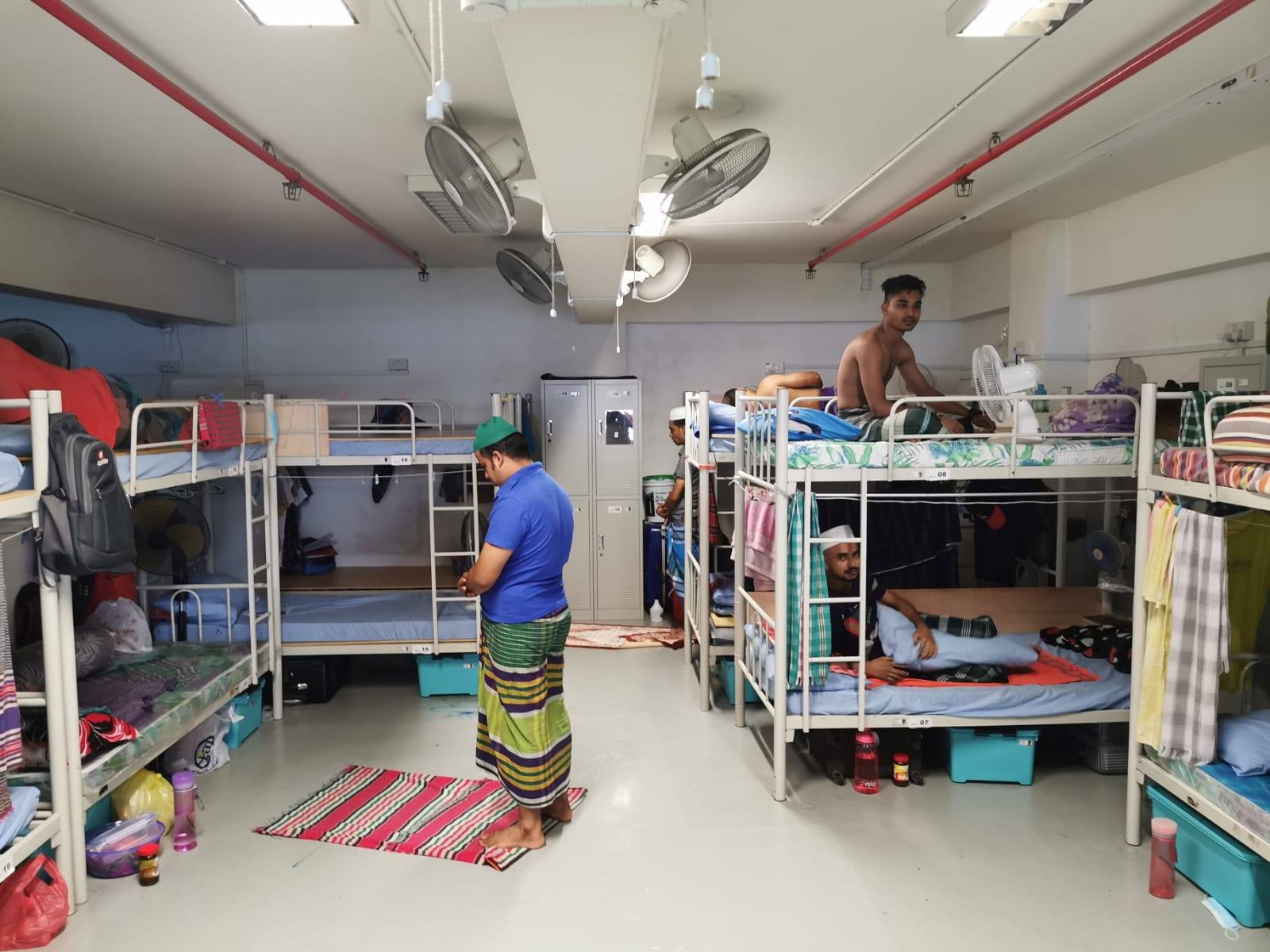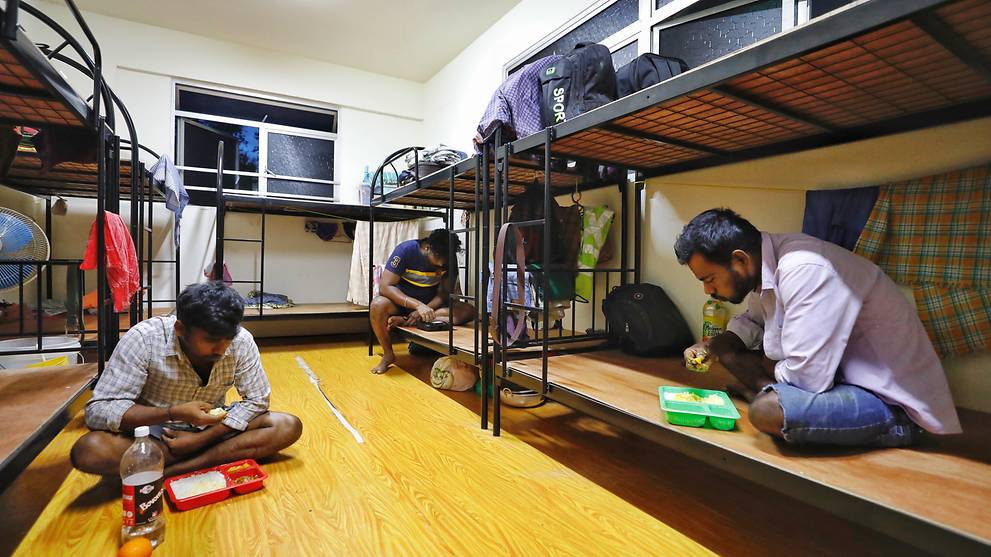
Fill Me In
As Singapore looks forward to easing more of its restrictions and welcoming the opening of Phase 3 in the upcoming weeks, things are still looking rather bleak for the migrant workers in Singapore. Despite lifting the restrictions for the community, migrant workers are still given limited access to the outside world.
Their new world consists of being confined in the small room of their dorm, shared with thousands of other workers. This is only punctuated by random dormitory checks by the Ministry of Manpower (MOM), who make sure the migrant workers are practicing safe social distancing to mitigate the spread of the virus.
Meet Mohd Azwa, a Malaysian migrant worker in Singapore
When Singapore entered circuit breaker in March, Mohd Azwa, 38, found himself making a very tough decision of either staying in Singapore or remaining in Malaysia to be with his family. He chose the latter.
But thankfully for him, the engineering company that he worked for was very much understanding of the whole situation and still made sure that he was paid. The father of two was one of those lucky ones who had a company that paid close attention to the welfare of its workers. However, that dream of being with his family was soon snatched away from him.
Torn between borders
The construction sector was severely impacted by the virus. Work was put on pause for months after the first infection among migrant workers was detected in February.
However, when things picked up again, and Malaysia and Singapore eased movement between borders, Azwa found himself having to make another tough decision – lose his job to stay in Malaysia with his family, or work in Singapore in order to provide for a better future for his wife and two kids. This time round, he chose work.
“It was not an easy decision, but as the head of the family, I had to do what’s best – and I think this is the best,” he said.
Back in Singapore
The construction worker who has devoted 10 years of his life to Singapore’s economy found himself to be in bad mental health when he arrived in Singapore. The mandatory 14-day quarantine for all travellers arriving in Singapore proved challenging for Azwa.
“I have never been away from my kids and my wife before. This is really the first time and it affected me really badly. I felt so alone, trapped and had no one to turn to,” he said.
Post-quarantine, Azwa is still struggling to adapt to new changes. He now stays in a flat with people he barely knows. The house that was once filled with the laughter of his children is now dull, quiet and foreign.
Meet Mehdi Mohamad, a Bangladeshi migrant worker
The Bangladeshi worker first arrived in Singapore four years ago, leaving behind his elderly parents and four young siblings. As the eldest son, he felt a sense of duty and responsibility to look after his family.
Since starting work in Singapore, Mehdi has always made an effort to send part of his salary back home to his family as frequently as he could. However, when Singapore entered circuit breaker, and migrant workers were placed in lockdown, he had to rely on his bosses to help send funds on his behalf. The slow and complicated process put Mehdi under a lot of pressure and stress.
The 28-year-old said: “The situation in Bangladesh is bad. I am very worried and scared for my family. Sometimes I do feel selfish because I am looked after really well in Singapore. But for my family back home, who looks after them?”
The government has said that it is looking to relax the restriction for the foreign workers but the plan looks like it’s under threat when migrants workers continue to make up majority of the daily cases in Singapore.
“Living in the dormitory can be really hard. Everything you can’t do. No cooking. Everything must follow schedule. No freedom, sometimes I feel like I am in jail,” expressed Mehdi, who found himself to be stuck in a very strict regime ever since the pandemic happened.
He added that he faces high stress levels and often feels like there is no way out.
He wishes for the restrictions to be relaxed to ease the stress off him and the thousands of other foreign workers in a similar predicament.
Did the pandemic open a can of worms for Singapore?
It is safe to say that the pandemic has affected all of us differently. However, the impact that it has taken on the migrant workers is one that cannot be missed.
When Singapore entered circuit breaker, migrant workers were also placed on lockdown in their dormitories. Their movements were restricted, as a majority of Singapore’s COVID-19 cases came from them. Some were not allowed to leave their rooms. Meals were delivered to their doors, but they were required to stay put.
On the other hand, while locals were also asked to remain at home and only go out when necessary (for example, to buy groceries), they were still encouraged to participate in daily exercise, and were allowed to do so outdoors.
The contrast between the two gained widespread attention for the way Singapore treated their migrant workers. The way migrant workers were being housed – often in unsanitary and overcrowded dorm – also came under critical scrutiny.
Experts warned that the dire living conditions of the workers was a hot spot for the spread of the virus due to the lack of social distancing and basic hygiene. Migrant workers, most of whom work in construction, have found themselves to be treated like third class citizens. Unfortunately, it took the pandemic for Singapore to realise its unjust treatment to the migrant workers.
For many years, rights groups such as Transient Workers Count Too has pointed out that the living conditions are “a ticking time bomb”. ‘Small’, ‘packed’ and ‘dirty’ were also just some of the words described by the migrant workers.
Recently, Labourtel Management Corporation, which runs several foreign workers dormitories was fined $118, 000 after authorities found some of the room to be filthy and in unacceptable living condition. Inspectors found cockroaches in rooms, broken toilets and showers, and corroded railings that undermined the safety of the migrant workers living there.
Living in small spaces, often with bad ventilation also meant that the risk of infection from the highly contagious COVID-19 virus was also high.
Peter Collignon, an infectious diseases physician and a professor at the Australian National University Medical School said: “If you’ve got relatively socio-economically deprived people in crowded housing, you’ll get COVID-19 transmission at a higher rate.”
What has the Singapore government done for our migrant workers?
Since the criticisms, the government has lifted some of the burdens of the workers, such as ensuring that they are being paid on time and providing free data SIM card.
Dormitories are also being regularly visited by officials from MOM, who check up on the migrant workers’ physical and mental well-being.
Resources such as the FWMOCare mobile app was also introduced, in order for authorities to monitor the health of the workers better.
Last month, MOM announced that all dorms were free from COVID-19. Though things are improving significantly, it seems that the restrictions on the migrant workers will still be in place, many unsure of when they will be relaxed.
What can we do?
As a start, it is important to not alienate the people who have left their family behind to contribute to Singapore. At the end of the day, the pandemic is something that we did not see coming. It is indeed unfair to treat migrant workers differently just because they make up a majority of the cases.
It has been heartening to see many Singaporeans extend their kindness by setting up GoFundMe pages to raise funds for the migrant workers and even initiating a donation drive so that our migrant workers are kept well and safe as we navigate through these tough times.
Things are looking up for our little nation and hopefully, it won’t be too long before our migrant workers can claim their freedom back too.




























